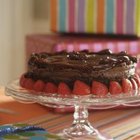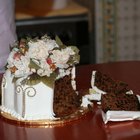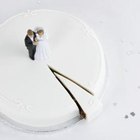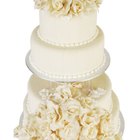
It's an unfortunate characteristic of the holiday season that you have a larger than usual number of things to do, and less time than usual to do them. You can help yourself by preparing Christmas treats and sweets as far ahead as possible, refrigerating or freezing them for later use. Elaborate treats such as Yule logs can be problematic to freeze once they're decorated. Follow a few simple guidelines, however, and you'll be able to easily freeze, thaw and serve your gorgeous holiday treat.
History of Yule Logs
The original Yule log was an actual tree burned on the household's hearth around the time of the winter solstice. Although that tradition began to fade with the arrival of central heating, the name is kept alive through a special holiday cake. It's a sheet cake rolled around a creamy filling and then decorated with brown buttercream icing. Simple versions might have little further decoration, but pastry chefs and skilled bakers can use buttercream, fondant and meringue to make remarkably detailed and lifelike bark, lichens and even mushrooms on the "log."
Freezing Your Yule Log
The simplest way to freeze a Yule log cake is before it's decorated, but that provides little time-saving benefit. Cakes covered in buttercream can be frozen successfully -- professional bakers do it, when pressed -- but it does take some care. Clear enough space in your freezer for the log to sit uncovered on a cookie sheet for one to two hours. This hardens the frosting to the point that the cake can be safely wrapped. Cover the cake with plastic film wrap, pressing the wrap to the cake's surface to eliminate as much trapped air as possible. Place the cake in a box or rigid container to protect it from accidental damage, and return it to your freezer.
A Few Practical Tips
If you prepare a lavish Yule log with lots of decorations, they might require some additional care when freezing. Piped-on icing decorations can be among the most fragile. Once the cake is frozen, wrap them gently in bubble wrap, tissue paper or twisted plastic film wrap for added protection. Alternatively, leave those few details off the Yule log until you've defrosted the cake. If you make decorative additions from molded or rolled fondant, store them separately in an airtight container, where they'll keep better than if they're frozen and thawed. Meringue mushrooms can be preserved that way as well, although the container should contain a few bags of silica gel -- available from craft stores -- to help keep the air and mushrooms dry.
Thawing Your Cake
Defrosting your cake is the trickiest part of the process. The best method is to thaw it slowly in your refrigerator for a day or two, then letting it come to room temperature later on the counter. Don't unwrap the cake until it has reached room temperature, especially in a humid climate, or condensation will form on the icing and spoil its appearance. The exception is if you see frost inside the wrapping. In that case, remove the plastic wrap, brush away any surface frost, and put the cake in front of a fan. The moving air will prevent the icing from forming condensation. Once the cake has fully warmed, you can transfer it to a serving tray and position any remaining decorations.
Related Articles

How to Defrost a Frozen Cake With ...
Freezing a Cake With Buttercream ...
How to Freeze a Fruitcake

How Long Can Cupcakes Be Stored After ...

Do You Have to Refrigerate Your Wedding ...

How Do I Preserve Buckeyes?

Do You Need to Refrigerate Whipped ...

Proper Storage of a Carrot Cake

How Long Before an Event Should I Bake ...

What Will Happen if You Refrigerate ...

How to Make a Box Cake Firmer to Frost

How to Keep Cake Moist Overnight ...

How to Put Artificial Flowers on Cakes

How Early Can You Make a Wedding Cake?

How to Soften a Stiff Buttercream

How to Keep a Wedding Cake with ...

Storage for a Sheet Cake With Whipped ...

How to Freeze Wedding Cake

Directions for an Egg-Shaped Cake for ...

How to Wrap Individual Pieces of ...
References
- The Professional Pastry Chef; Bo Friberg
- The Kitchn: Can I Freeze a Fully-Decorated Birthday Cake?
Writer Bio
Fred Decker is a trained chef and prolific freelance writer. In previous careers, he sold insurance and mutual funds, and was a longtime retailer. He was educated at Memorial University of Newfoundland and the Northern Alberta Institute of Technology. His articles have appeared on numerous home and garden sites including GoneOutdoors, TheNest and eHow.
Photo Credits
Jupiterimages/Comstock/Getty Images